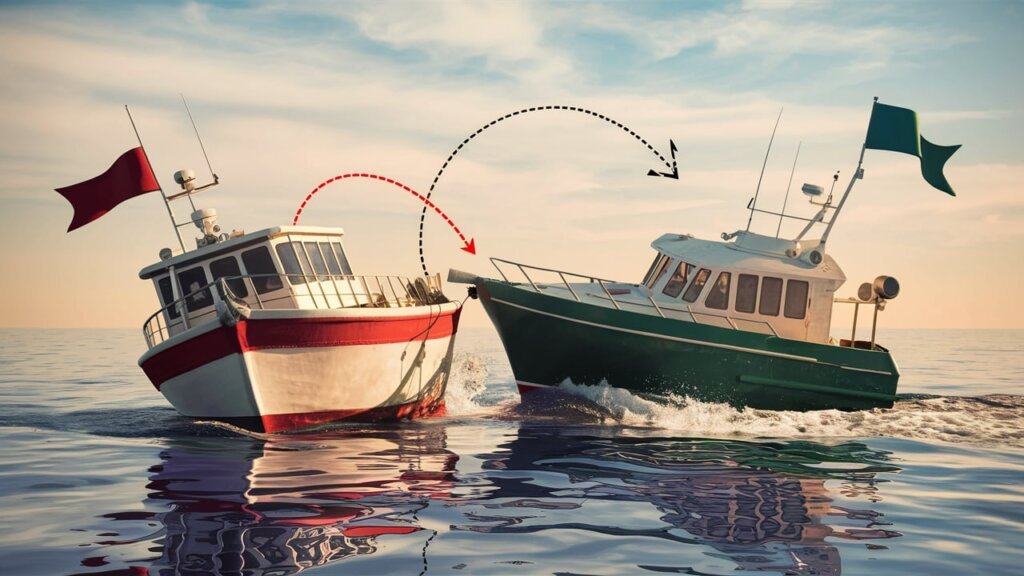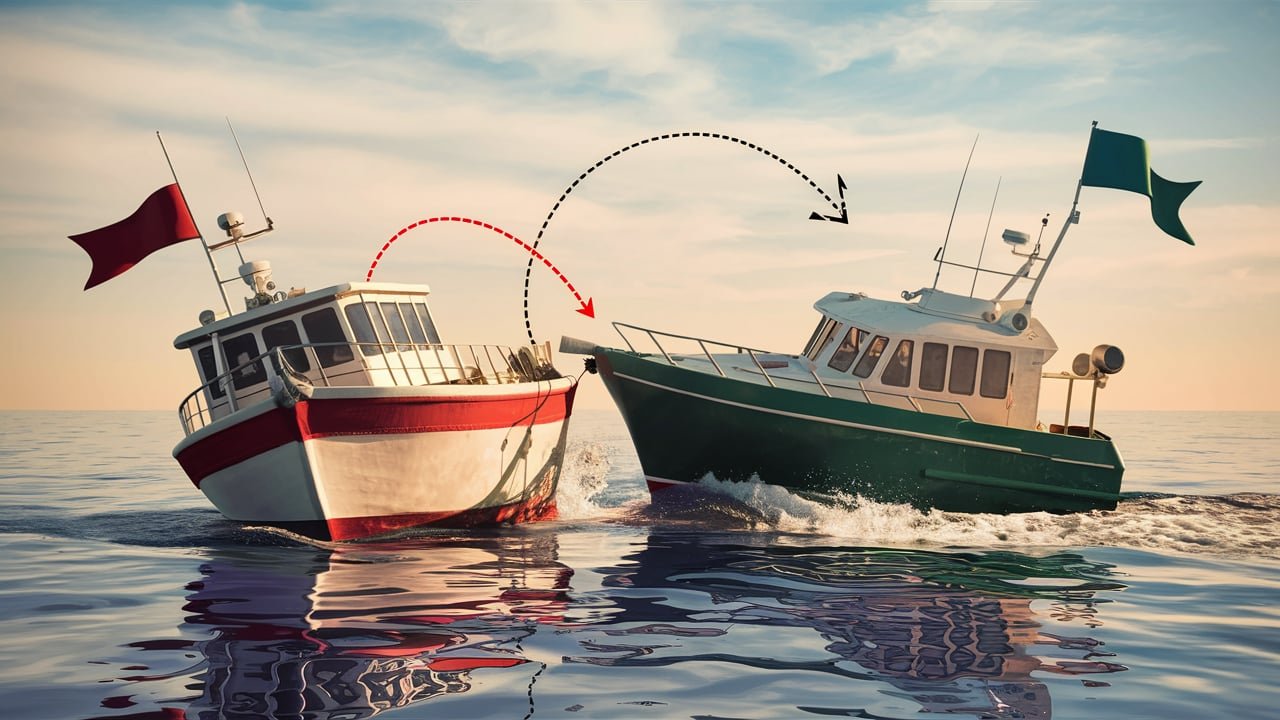
A collision occurs when one boat bumps into another boat and strikes it while floating in the river
or sea or it can also happen while one boat is standing fixed at the shore while the other comes
floating. In Maritime environment a collision of two boats is a prone accident and can cause
serious damages to the boats that hit each other. The damage is not only restricted to the body
of the boat but sometimes it can also cause the injury or even death of the crew members that
are on board.
It is the duty and responsibility of the operator of a boat to prevent collision.
In order to prevent collision the boat and the vessels operator should follow some general
instructions and rules:
1-First of all the operator of the vessel should be mindful of the instructions, the rules and
regulations of navigation and the international rules about how two ships approaching each
other should behave.For that he or she must have a guiding chart or table that is containing all
the instructions regarding navigation.
2-Secondly the operator should also look out for navigational markers and aids that are
specially designed to guide vessels through Marine environment, inform them about any kind of
obstruction or danger that is present, and help them navigate the sea while ensuring their safety
and the prevention of any kind of collision with another boat or any kind of obstruction that is
present in the sea. For this the best option is that the operator must appoint a crew member to
look out for these navigational markers or aids.
3-Thirdly the operator should also maintain an optimum speed, while navigating the sea
particularly during night and during congested traffic conditions when there is a chance of
collision or bumping into another boat.
4-Then the operator must also be careful while taking any kind of turn and must look around,
left, right and in proper directions in order to take a safe turn.
5-Going further, beside all the above mentioned precautions, the operator of the vessel or boat
must also be careful while traveling or navigating directly into Sun’s glare at the water because
this can cause reflection and can lead to reduced visibility as well as difficulty in spotting
hazards,dangers or obstructions.
6-As aforementioned, the collision of a boat or a vessel is the primary mistake of the operator of
the vessel so beside looking out for external problems the operator must also ensure that he is
in a fit position to navigate. The operator should insure that he is not fatigued, stressed or in
alcoholic conditions because these can lead to delayed responses,impaired judgements and
increase the risk of errors which In turn increase the risk of collision as well. So the operator
must take appropriate rest before navigating, should avoid alcohol consumption and should be
given proper training before being allowed to navigate in the sea.
7-Weather conditions should also be considered before navigation. The operator must not
navigate in rough weather conditions or during heavy rainfalls because heavy rainfall can cause
the floating debris to rise to the surface which increases the chances of collision. Similarly if a
boat is navigating in foggy conditions it is quite possible that it might bump into another boat or
obstruction due to reduced visibility so it should also be avoided.
8– Mechanical errors can also sometimes lead to boat collisions. Engine malfunction steering
failures or equipment failures are common examples of mechanical malfunctions that can lead
to the collision of boats. So in order to prevent the collision of boats all the mechanical parts
should be examined properly by the operator before navigation.
9– Sometimes operational mistakes by the operator can also lead to the collision of boats such
as improper maneuvering, speed management, lack of coordination, miscommunication and
failure to correctly interpret visual or other signals. So in order to prevent the collision of boats
these operational mistakes should also be removed and the operator should be properly trained
before allowed to navigate the vessel.
10– Sometimes navigational errors also lead to the collision of boats. Misinterpretation of
navigational aids or buoys can lead to incorrect navigational decisions that can in turn
sometimes lead to boat collision. So in order to avoid navigation errors it is necessary that the
operator should be fully trained and have a comprehensive understanding of navigational
markers before navigation.
So to sum up we can say that the operator or the captain of the boat is responsible for the
safety of all the passengers or the crew members on the boat as well as of the vessel. So the
captain must always remain alert and attentive in order to avoid any kind of collision. He should
carefully navigate his vessel through the water while at the same time he should be respectful of
the other vessels on the water as well. He should be properly trained to avoid any kind of
navigational errors and operational mistakes.Beside this boating conditions, weather conditions,
environmental hazards, navigational markers should also be taken into consideration. He should
also know the boating rules on the water.
Many collisions are avoidable and can be controlled, considering the open space of the water.
The best possible way to prevent collision is to stay alert and attentive at all the times. A good
boater is the one who is mindful of all the laws, is eager to self educate and has a sense of duty
and responsibility. The international rules on how ships approaching each other should behave
, must also be known by the boaters. So beside being mindful of the external conditions while
navigating and the personal condition the boater must also be mindful of other boats navigating
in the same environment.

